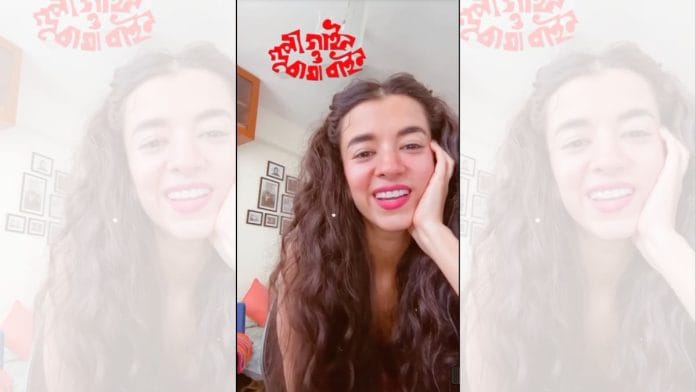Actor Saba Azad had no way of knowing that a 2022 clip of her singing a few lines from the hit song from the 1969 Satyajit Ray film Goopy Gyne Bagha Byne would give voice to hurt Bengali sentiment in 2025.
Bengalis are hurt over a statement by the Delhi police calling Bangla a ‘Bangladeshi language’ and the lines Azad sang have unwittingly become protest music in Kolkata now.
The internet doesn’t forget. Old clips are dug out to fight new narrative wars, and good art is pulled back into relevance to counter bad politics. Poetry becomes protest, prose and songs turn into battle cries as art takes on new meanings.
Bengali, Bangladeshi, Azad(i)
A letter from Delhi Police dated 24 July to the Banga Bhawan guest house in New Delhi’s Chanakyapuri area, referred to Bangla as “Bangladeshi language” and triggered a major political row. The letter was written by Inspector Amit Dutt from Lodhi Colony Police Station to the officer-in-charge of Banga Bhawan, requesting a translator to decipher documents seized from suspected Bangladeshi nationals.
The letter said that the police needed an interpreter “proficient in Bangladeshi national language” to translate documents for a case involving eight persons “strongly suspected to be Bangladeshi nationals residing illegally in India”.
A major political row broke out between the Bharatiya Janata Party (BJP) and the Trinamool Congress (TMC), with the latter calling it a “deliberate attempt to strip a constitutionally recognised Indian language of its identity and demanding an apology”. The BJP hit back, accusing the TMC of shielding illegal Bangladeshi settlers.
But outside the political arena, the controversy united otherwise argumentative Bengalis to fight for their mother tongue and take to social media to express their ire. Sharing a copy of the letter on his Facebook, popular Bengali filmmaker Srijit Mukerji wrote: “That’s not Bangladeshi language, morons, that’s Bangla or Bengali, the same language in which your national anthem was originally written and one of the 22 official languages of India.”
Academic Ajay Chakrabarti wrote that there is no such language called “Bangladeshi language”. “All Bengalees speak Bangla. The Bangladeshis also speak Bangla. Of course, there are several dialects,” Chakrabarti posted on Facebook.
Even as the outrage showed no signs of abating, a 2022 clip of actor Saba Azad crooning some lines from the famous song Maharaja Tomare Selam resurfaced on social media. Crudely translated, the lines mean: “Your majesty, salutations, salutations, salutations/ From Bangladesh we have come / We are simple, down to earth and travel various nations / Your majesty, your highness / Except ours, we have no other elocution”.
Also read: One Bengali film a day in Bengal’s theatres. ‘Step against arm-twisting Mumbai companies’
Old notes, new meanings
It’s been three years since Saba Azad sang these lines and 56 years since Satyajit Ray composed the song and playback singer Anup Ghoshal sang it. Recalling scenes from Ray’s funeral procession on 24 April 1992, actor Soumitra Chatterjee had said: “I remember a few young men suddenly started shouting a slogan. Initially, I couldn’t make out what they were saying, but then it was loud and clear: “Maharaja tomareselam!” This can only happen in Calcutta, in appreciation of a great artiste.”
Even in 2022, when Saba Azad posted the cover, it hadn’t gone unnoticed. In an article headlined ‘Hrithik Roshan’s rumoured GF Saba Azad sings ‘Maharaja Tomare Selam’, The Telegraph wrote how her cover got love online. “Actor-director Konkona Sen Sharma too reacted to the post, appreciating Saba’s Bengali pronunciation,” the article reported.
But now, with a raging controversy over the Delhi police’s use of ‘Bangladeshi language’ for Bangla, Azad’s clip has found a life of its own. Entertainment journalist Anindita Mukerjee told ThePrint that not just in West Bengal but from Maharashtra to Karnataka, the language war has divided people across the country.
“It is at such times when the shrill of heated arguments almost deafens us that Saba’s clip brings peace to the ears. She is so effortlessly sincere in her singing, so comfortable with a tongue that’s not hers,” Mukherjee told ThePrint.
Azad’s 2022 clip has also found fans across the border in Bangladesh, where they are both amused and angry at the controversy. “What your police said only goes on to prove how Bangladeshis are looked at in India. Not only are we targeted by the locals and the law in India, even our language, which we share with Bengalis of West Bengal, is now a foreign tongue in India,” Bangladesh Nationalist Party youth leader Sheikh Eklas Audy told ThePrint.
Bangladeshi actress Rafiath Rashid Mithila, who had shared Azad’s clip on her Facebook story recently, said there is no language called the Bangladeshi language, and Azad has sung beautifully.
Not everyone on this side of the border is blaming the Delhi police. Musician and podcaster, Neerajan Saha, said that in the Bangladeshi version of the Bengali language, many Bangla words have been replaced over the years with Arabic and Farsi words and the process is happening in full steam.
“Satyajit Ray never replaced Bengali words with words from foreign languages in his songs or films. Given the attack on the minority Hindu population in Bangladesh today, the concerted attempt to make Bangladesh Hindu-free, the debate over language on this side of the border is laughably irrelevant,” Saha said.
The anger in West Bengal over the Delhi police’s seemingly unwitting mistake of referring to Bangla as the Bangladeshi language has not lessened. Social media feeds are filled with vitriol against this attack on Bangla.
This language is the reason why East Pakistan became Bangladesh in 1971, and a majority of people in West Bengal hold it very close to their hearts. At such polarising times, Saba Azad’s 2022 cover of Maharaja Tomare Selam has become both a song of solace and rage.
Deep Halder is an author and journalist. He tweets @deepscribble. Views are personal.
(Edited by Theres Sudeep)






